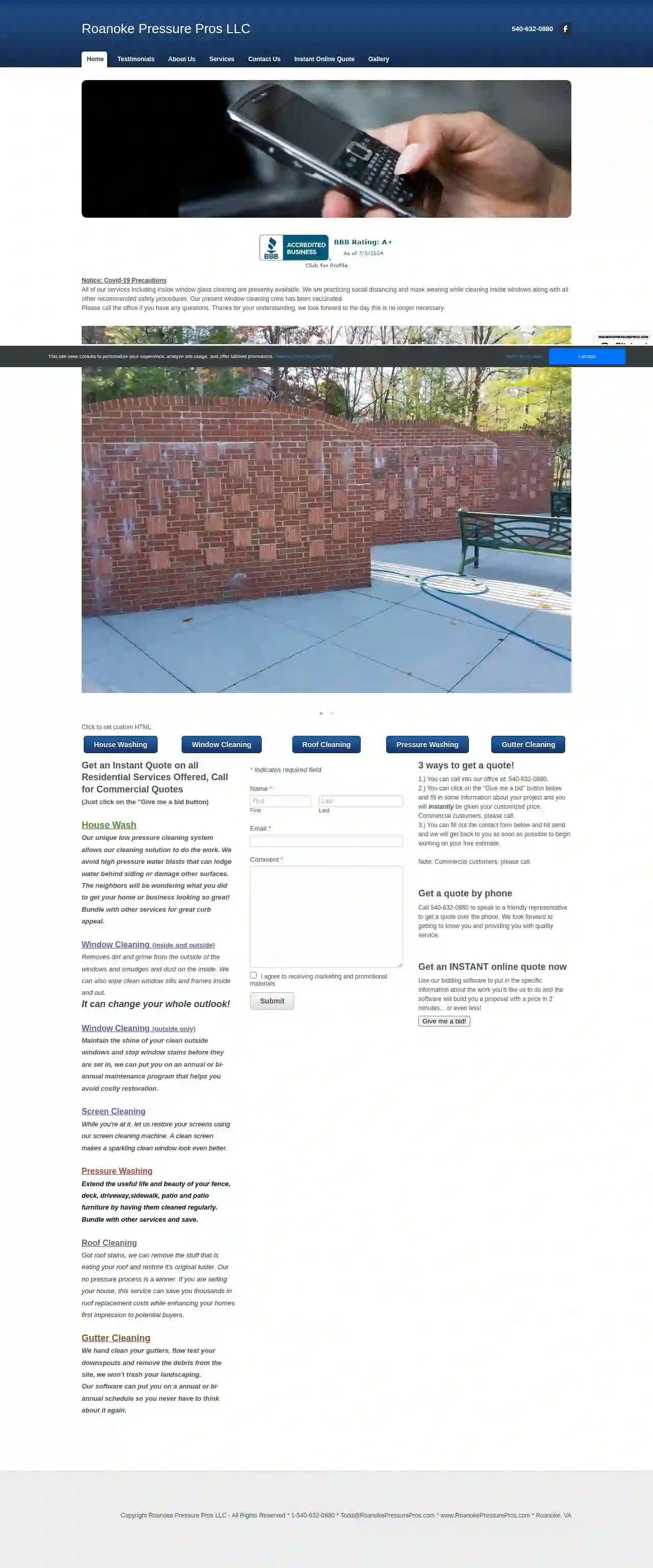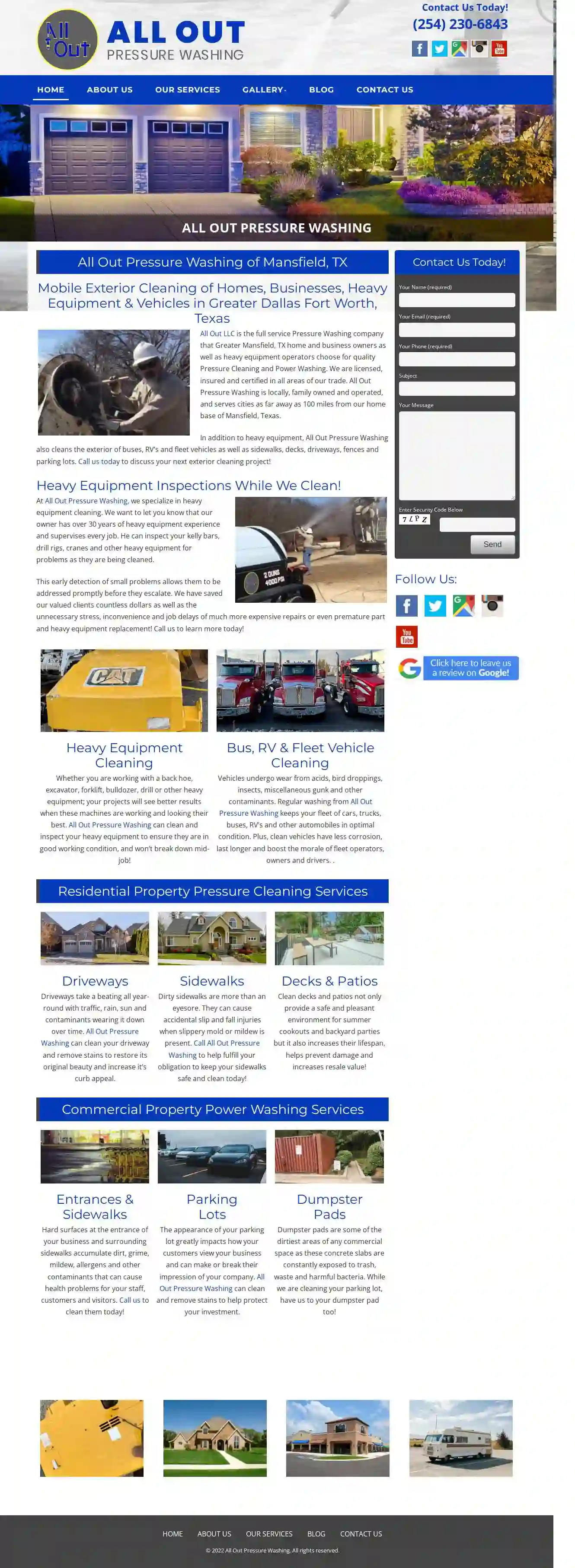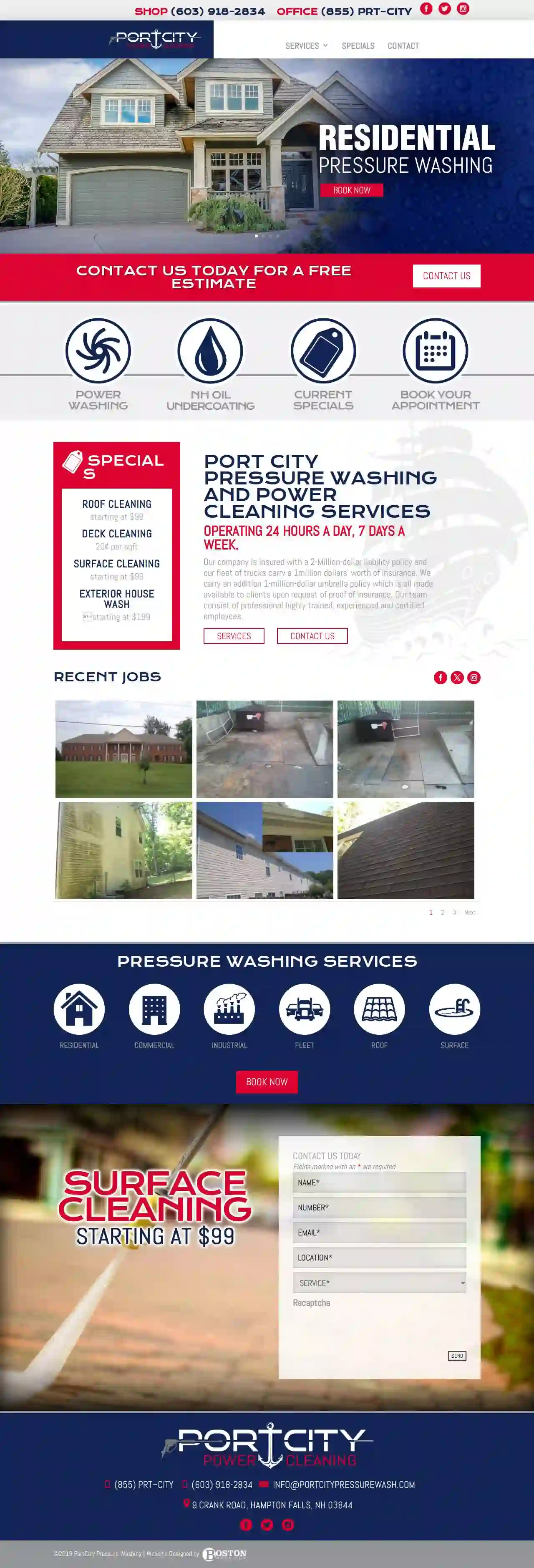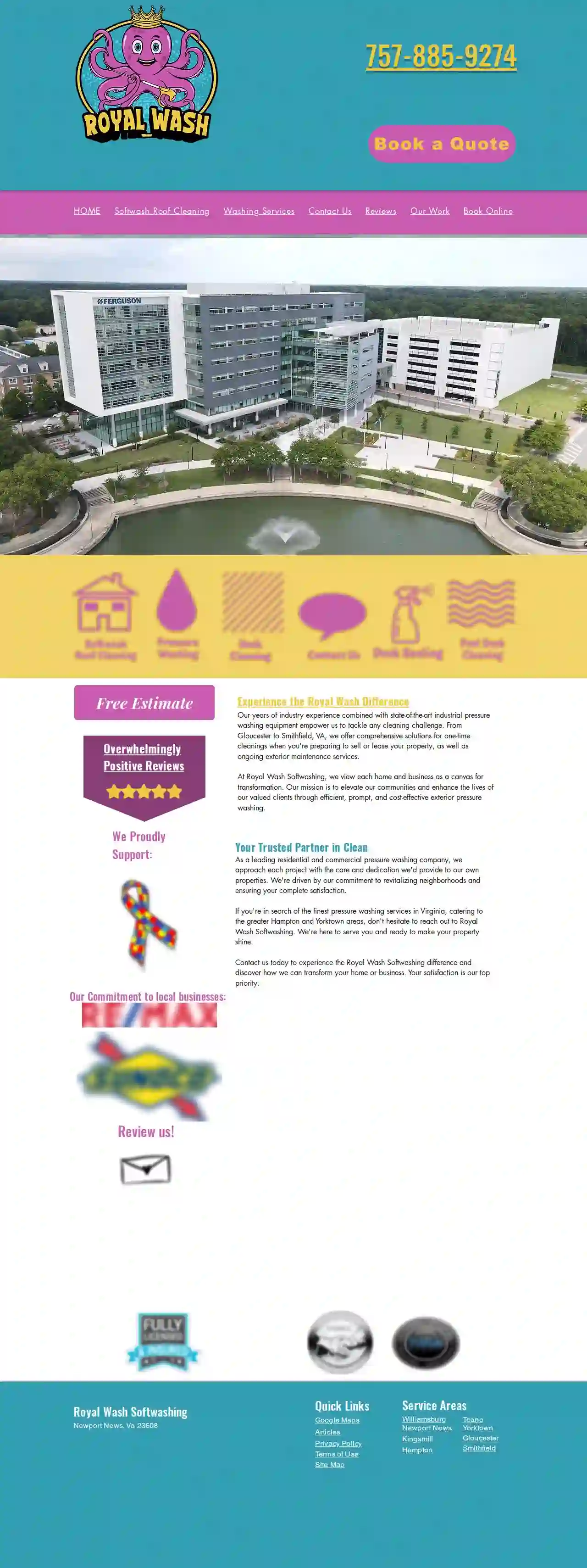Pressure Washing Front Royal
Top 10 Power Washing in Front Royal
Get multiple Commercial Pressure Washing quotes for your project today! Compare profiles, reviews, accreditations, portfolio, etc... and choose the best service.

Prestige Washing
4.914 reviewsUSWelcome to Prestige Pressure Washing! We are a small, fully insured business dedicated to providing top-notch pressure washing services to residential and commercial clients in New Hampshire, Maine, and Massachusetts. Customer satisfaction is our top priority, and we strive to exceed your expectations with our professional, expert services. We understand that your home or business is important to you, and we treat it with the utmost care. Our team of experienced technicians uses the latest equipment and techniques to ensure a thorough and effective clean. Whether you need your roof cleaned, your driveway power washed, or your entire house soft washed, we can handle it all. We are committed to providing our clients with a hassle-free experience. We offer free estimates, flexible scheduling, and competitive pricing. If you are unhappy for any reason or your expectations have not been met, please call and ask for Shane. Experience the convenience and peace of mind that comes with choosing Prestige Pressure Washing. Contact us today for a free estimate!
- Services
- Why Us?
- Gallery
Get Quote
Good as New Exterior Cleaning and Pressure Washing
57 reviewsGoffstown, NH, 03045, USGood as New Exterior Cleaning and Pressure Washing, located in Goffstown NH offers services to both residential and commercial clients. We are locally-owned and owner-operated. The owner is present on all jobs, guaranteeing that you will be provided with safe, quick and efficient work every time you call! Free estimates are available and our prices are always competitive so call today for all of your home or business improvement needs! Here at Good as New, we pride ourselves on our attention to detail and our remarkable customer service. We will do whatever it takes to earn your business and make sure that you're happy! When you hire us for a job, be it an exterior or roof wash, a surface cleaning or a gutter job, we will go above and beyond your expectations every time! Contact us today for all of your residential and commercial exterior cleaning needs!
- Services
- Why Us?
- Our Team
- Testimonials
- Gallery
Get Quote
Roanoke Pressure Pros LLC
4.9290 reviewsRoanoke, VA, 24018, USRoanoke Pressure Pros LLC is a locally owned and operated business dedicated to providing high-quality pressure washing and window cleaning services to residential and commercial clients in Roanoke, VA. We take pride in our commitment to customer satisfaction and strive to exceed expectations with every job. Our team of experienced professionals utilizes the latest equipment and techniques to ensure thorough and efficient cleaning. We offer a wide range of services, including house washing, window cleaning (inside and outside), roof cleaning, pressure washing, and gutter cleaning. We understand the importance of maintaining a clean and inviting exterior for your home or business, and we are here to help you achieve that goal.
- Services
- Why Us?
- Our Team
- Testimonials
- Gallery
Get Quote
PERFECTION POWER WASHING LLC
549 reviewsPerfection Power Washing, Haverhill, 01835, USPerfection Power Washing is a professional contractor offering exterior cleaning and pressure washing services to help remove years of grit, grime, and grease quickly, affordably, and safely. We are dedicated to helping our clients with all sizes of exterior cleaning projects and a variety of pressure washing services. From boats and RVs to fleet and commercial building complex washing projects, Perfection Power Washing is ready for all types of pressure washing needs in the Haverhill, MA and Southwest Florida area. Our team is supplied with the skills and equipment to complete your cleaning projects safely, efficiently, on-time, and on-budget. We are proud to bring our industry experience to each and every job we do. Whether you're looking to clean up the boat or RV, finish a minor clean-up job to restore curb appeal, or prepping for a major project, our knowledgeable team has the skills and tools to make sure the job is done right. Our team is large enough to deliver professional exterior cleaning solutions while offering the personal touches that ensure we meet your goals and exceed your expectations.
- Services
- Why Us?
- Accreditations
- Gallery
Get Quote
All Out Pressure Washing
54 reviews123 Main St, Suite 100, Mansfield, 76063, USAll Out Pressure Washing is a full service Pressure Washing company that Greater Mansfield, TX home and business owners as well as heavy equipment operators choose for quality Pressure Cleaning and Power Washing. We are licensed, insured and certified in all areas of our trade. All Out Pressure Washing is locally, family owned and operated, and serves cities as far away as 100 miles from our home base of Mansfield, Texas.
- Services
- Why Us?
- Accreditations
- Our Team
- Testimonials
- Gallery
Get Quote
Suffolk Power Washing LLC
513 reviewsBay Shore, 11706, USSuffolk Power Washing LLC is a full-service exterior cleaning company proudly serving Suffolk County and Nassau County. We offer a range of services including Roof Washing, House soft washing, paver cleaning and sealing, Gutter Cleaning and more. Our team of professionals uses state-of-the-art power washing machines for hard surfaces and a specialized soft washing system for delicate surfaces. We are committed to providing high-quality, environmentally friendly cleaning solutions and exceptional customer service. Whether you need your home's exterior cleaned, your driveway power washed, or your commercial building's sidewalks cleared, Suffolk Power Washing is here to help. We believe in delivering top-notch results at fair and competitive prices. Contact us today for a FREE ESTIMATE and give your home or business the clean it deserves!
- Services
- Why Us?
- Our Team
- Testimonials
- Gallery
Get Quote
Prime Time Pressure Washing & Roof Cleaning
582 reviewsChesapeake, USPat, you’re just a few clicks from going live! Don’t worry - we can still make edits after launching. Your trusted exterior cleaning professionals. Make it Shine with Prime Time! We specialize in soft wash exterior cleaning. PTP has a proud resume of cleaning residential & commercial properties in eastern NC & VA without overlooking any small details. Check out our services section for more info! Our Guarantee: Expert quality every time.
- Services
- Why Us?
- Testimonials
- Gallery
Get Quote
Port City Pressure Washing & Power Cleaning LLC
55 reviews9 Crank Road, Hampton Falls, 03844, USPort City Pressure Washing and Power Cleaning Services is a fully insured company operating 24 hours a day, 7 days a week. We are committed to providing professional, highly trained, experienced, and certified employees to serve all your pressure washing needs. Our company is insured with a 2-Million-dollar liability policy and our fleet of trucks carry a 1million dollars’ worth of insurance. We also carry an additional 1-million-dollar umbrella policy, which is available to clients upon request.
- Services
- Why Us?
- Gallery
Get Quote
Royal Wash Softwashing
513 reviews123 Main St, Newport News, VA, 23608, USExperience the Royal Wash Difference. Our years of industry experience combined with state-of-the-art industrial pressure washing equipment empower us to tackle any cleaning challenge. From Gloucester to Smithfield, VA, we offer comprehensive solutions for one-time cleanings when you're preparing to sell or lease your property, as well as ongoing exterior maintenance services.
- Services
- Why Us?
- Accreditations
- Our Team
- Testimonials
- Gallery
Get Quote
Platinum Wash
54 reviewsVirginia Beach, USWelcome to Platinum Wash, a local and family-owned pressure washing company serving Hampton Roads, Virginia for the last 2 years. Through a wide range of services, we restore the beauty and cleanliness of your property. Our service experts strive to exceed expectations in quality and professionalism. Discover the transformative power of pressure washing with Platinum Wash. Call or Email Us Today [email protected] (757)752-1762
- Services
- Why Us?
- Gallery
Get Quote
Over 60,241+ Cleaning Businesses onboarded
Our cleaning service providers operate in Front Royal and beyond!
CleaningMatch has curated and vetted the Best Janitorial Services in Front Royal. Find a trustworthy pro today.
Frequently Asked Questions About Pressure Washing
- Regular Cleaning: Sweep or rinse surfaces regularly to prevent dirt and grime from building up.
- Address Stains Promptly: Clean up spills or stains as soon as possible to prevent them from setting in.
- Trim Vegetation: Keep trees and shrubs trimmed away from surfaces to minimize shade, which can promote mold and mildew growth.
- Apply Protective Coatings: Consider applying protective sealants or coatings to surfaces like decks or fences to repel water and dirt, extending their lifespan and maintaining their appearance.
- Schedule Periodic Pressure Washing: Schedule periodic professional pressure washing to maintain the cleanliness and appearance of your surfaces over time.
- Electric Pressure Washers: Suitable for light-duty cleaning tasks like washing cars, patios, or fences. They are less powerful than gas pressure washers but are generally more affordable and easier to operate.
- Gas Pressure Washers: More powerful than electric pressure washers, making them suitable for heavier cleaning tasks like removing stubborn stains, cleaning driveways, or stripping paint.
- PSI and GPM: Consider the PSI (Pounds per Square Inch) and GPM (Gallons per Minute) ratings. Higher PSI and GPM indicate a more powerful pressure washer. For most home cleaning tasks, a pressure washer with a PSI of 2000-3000 and a GPM of 2-3 is sufficient.
- Degreaser: For optimal results, pre-treat the oil stains with a degreaser specifically designed for driveways. Allow the degreaser to sit for the recommended time before pressure washing.
- Hot Water: Using hot water in your pressure washer can be more effective at breaking down oil than cold water.
- Surface Cleaner: Using a surface cleaner attachment for your pressure washer can provide a more even and efficient cleaning result.
- 0-degree Nozzle: Produces a highly concentrated, powerful jet of water for removing stubborn stains or stripping paint. Use with caution as it can damage surfaces easily.
- 15-degree Nozzle: A versatile nozzle for cleaning concrete, brick, and other hard surfaces. Provides a good balance of pressure and coverage.
- 25-degree Nozzle: A wider spray pattern for cleaning delicate surfaces like siding or fences.
- 40-degree Nozzle: A very wide spray pattern, ideal for rinsing or applying cleaning solutions.
- Soap Nozzle: A low-pressure nozzle designed specifically for applying cleaning solutions.
- Rotary Nozzle: Also known as a turbo nozzle, it produces a rotating, high-impact spray for tackling tough stains and grime.
What are some tips for maintaining my pressure washed surfaces?
By implementing these maintenance practices, you can prolong the results of your pressure washing and keep your surfaces looking their best.
What type of pressure washer do I need for my home?
If you're unsure about the type of pressure washer best suited for your needs, consult with a pressure washing professional or a home improvement specialist.
Can pressure washing remove oil stains from my driveway?
If DIY pressure washing doesn't completely remove the oil stains, consider hiring a professional pressure washing company. They have specialized equipment and experience in dealing with stubborn stains.
What are the different types of pressure washer nozzles?
Choose the appropriate nozzle based on the cleaning task and the type of surface being cleaned. Consult the pressure washer manual or a professional pressure washer for guidance.
What are some tips for maintaining my pressure washed surfaces?
- Regular Cleaning: Sweep or rinse surfaces regularly to prevent dirt and grime from building up.
- Address Stains Promptly: Clean up spills or stains as soon as possible to prevent them from setting in.
- Trim Vegetation: Keep trees and shrubs trimmed away from surfaces to minimize shade, which can promote mold and mildew growth.
- Apply Protective Coatings: Consider applying protective sealants or coatings to surfaces like decks or fences to repel water and dirt, extending their lifespan and maintaining their appearance.
- Schedule Periodic Pressure Washing: Schedule periodic professional pressure washing to maintain the cleanliness and appearance of your surfaces over time.
By implementing these maintenance practices, you can prolong the results of your pressure washing and keep your surfaces looking their best.
What type of pressure washer do I need for my home?
- Electric Pressure Washers: Suitable for light-duty cleaning tasks like washing cars, patios, or fences. They are less powerful than gas pressure washers but are generally more affordable and easier to operate.
- Gas Pressure Washers: More powerful than electric pressure washers, making them suitable for heavier cleaning tasks like removing stubborn stains, cleaning driveways, or stripping paint.
- PSI and GPM: Consider the PSI (Pounds per Square Inch) and GPM (Gallons per Minute) ratings. Higher PSI and GPM indicate a more powerful pressure washer. For most home cleaning tasks, a pressure washer with a PSI of 2000-3000 and a GPM of 2-3 is sufficient.
If you're unsure about the type of pressure washer best suited for your needs, consult with a pressure washing professional or a home improvement specialist.
Can pressure washing remove oil stains from my driveway?
- Degreaser: For optimal results, pre-treat the oil stains with a degreaser specifically designed for driveways. Allow the degreaser to sit for the recommended time before pressure washing.
- Hot Water: Using hot water in your pressure washer can be more effective at breaking down oil than cold water.
- Surface Cleaner: Using a surface cleaner attachment for your pressure washer can provide a more even and efficient cleaning result.
If DIY pressure washing doesn't completely remove the oil stains, consider hiring a professional pressure washing company. They have specialized equipment and experience in dealing with stubborn stains.
What are the different types of pressure washer nozzles?
- 0-degree Nozzle: Produces a highly concentrated, powerful jet of water for removing stubborn stains or stripping paint. Use with caution as it can damage surfaces easily.
- 15-degree Nozzle: A versatile nozzle for cleaning concrete, brick, and other hard surfaces. Provides a good balance of pressure and coverage.
- 25-degree Nozzle: A wider spray pattern for cleaning delicate surfaces like siding or fences.
- 40-degree Nozzle: A very wide spray pattern, ideal for rinsing or applying cleaning solutions.
- Soap Nozzle: A low-pressure nozzle designed specifically for applying cleaning solutions.
- Rotary Nozzle: Also known as a turbo nozzle, it produces a rotating, high-impact spray for tackling tough stains and grime.
Choose the appropriate nozzle based on the cleaning task and the type of surface being cleaned. Consult the pressure washer manual or a professional pressure washer for guidance.